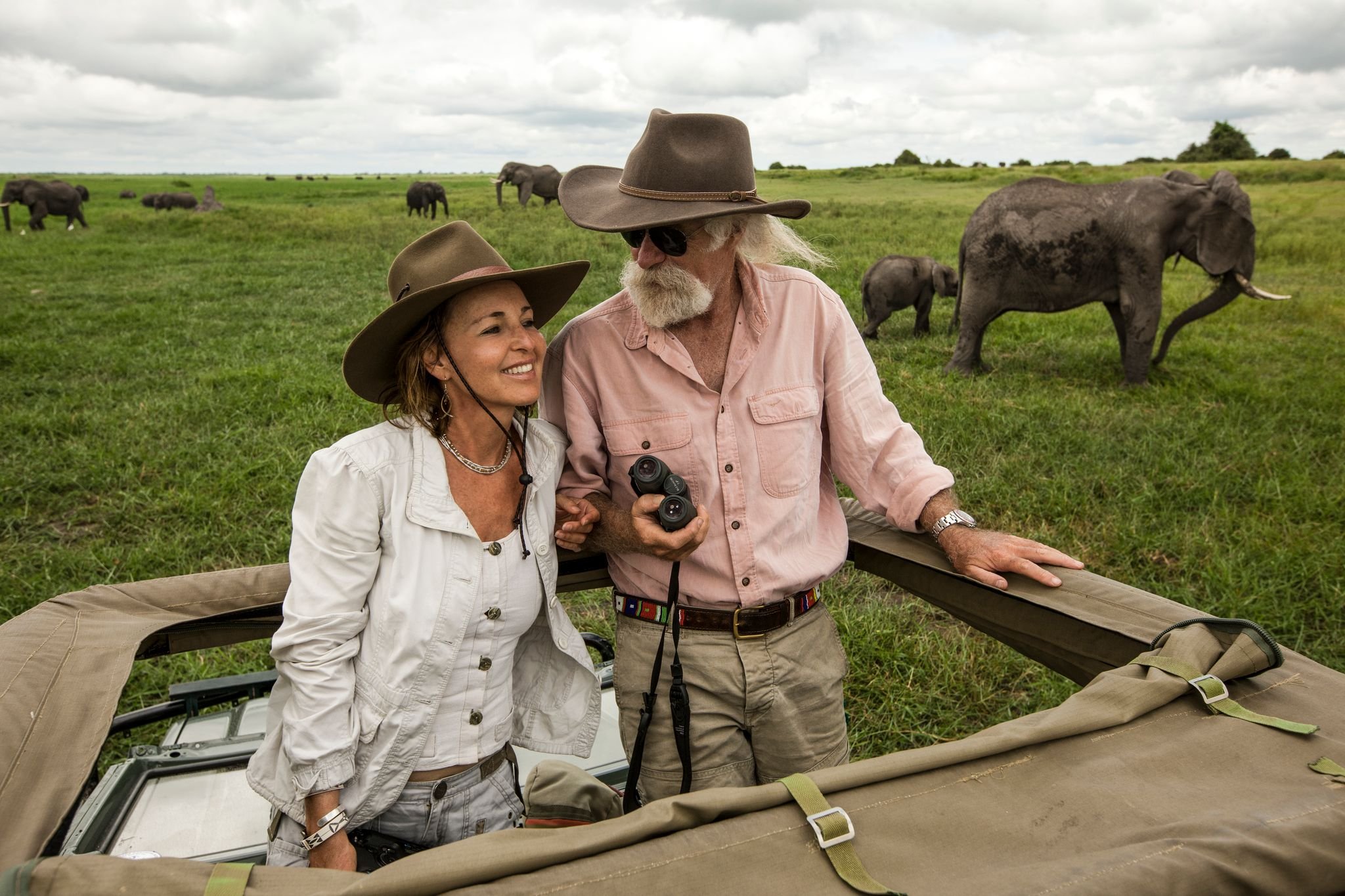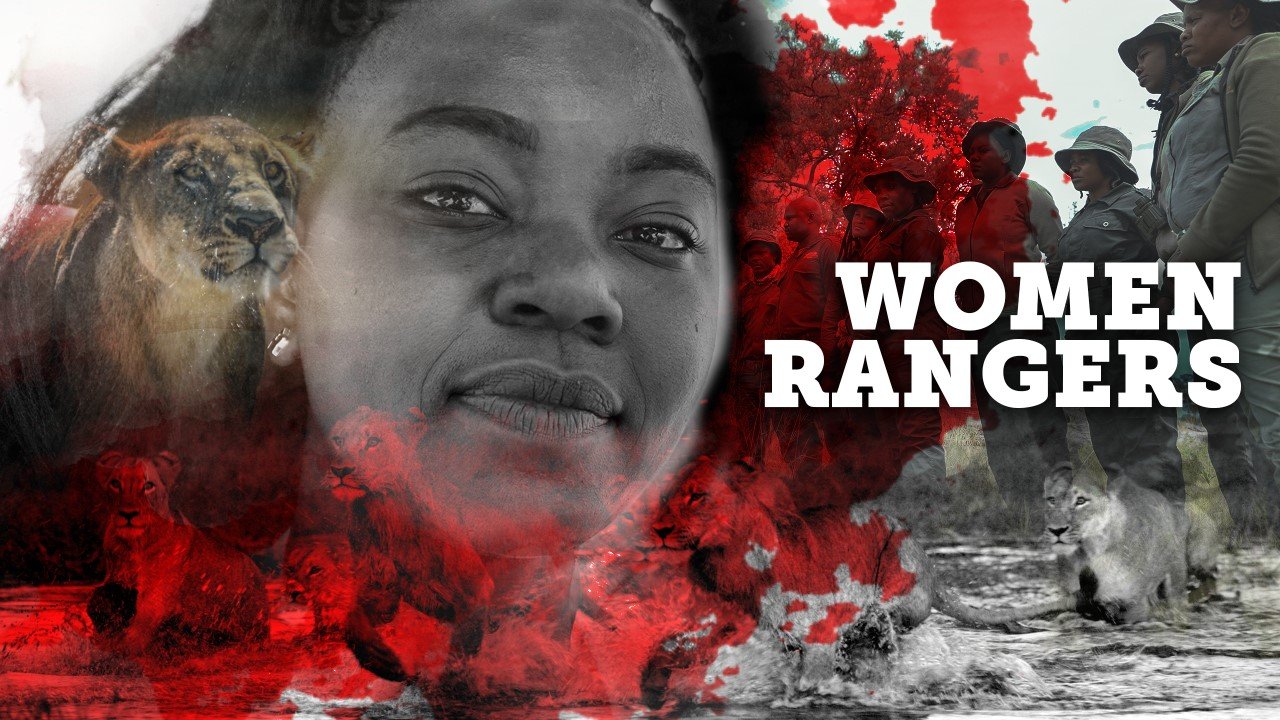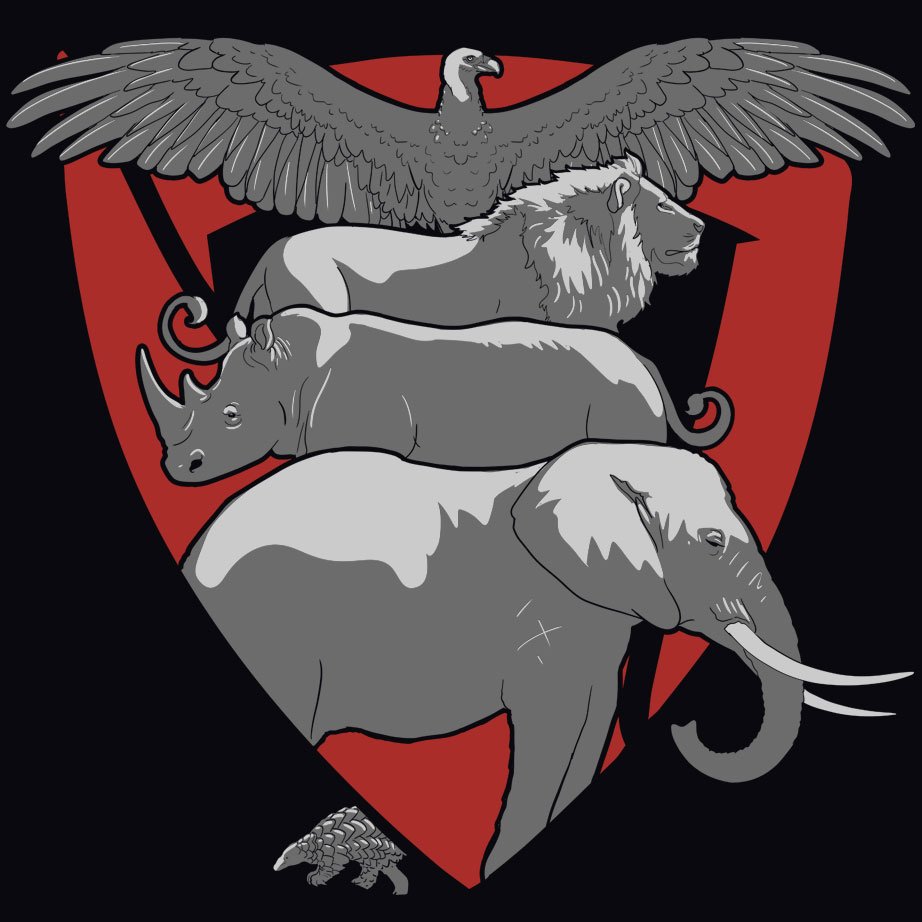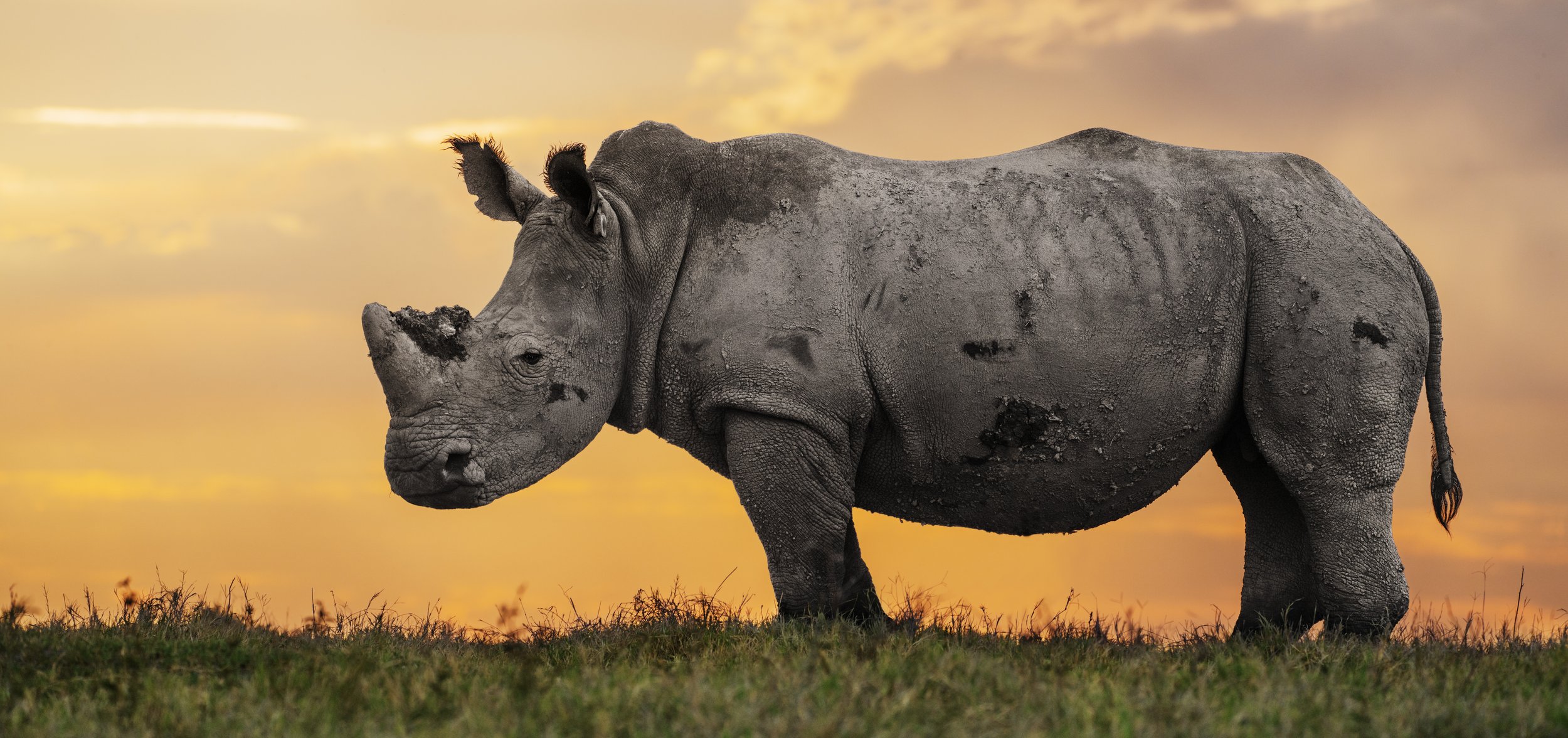The reason behind every Joubert film is conservation. They started filmmaking as a way to get that message out, and that ethic is reflected in everything they do, in all their films and books. Each project also shows a deep appreciation of the beauty, and understanding of wild Africa.
“It is my firm belief that what we have learnt since Darwin and Wallace is that islands and the wildlife on them are vulnerable. The smaller the island the more likely an extinction in the future. What we have done in African wildlife management is divide up free ranges and make them into islands of safe zones surrounded by wildlife hostile blocks, be they hunting, ranching, farming or civilization. If any effort at all is to be put into conservation it has to go towards linking these islands again, joining them up and recreating home ranges and natural migration routes. This can't happen without everyone's help, from governments to local communities to the commercial sector." Dereck continues, "However to insist that wildlife and nature pay for their existence is very short-sighted. Beverly adds; “We believe that the African landscape is a wonderful and beautiful thing. Mankind is also wonderful and we’re tremendously hopeful that we equipped with the knowledge, facts and increased appreciation we will understand that we are a part of nature not apart from it. If we can play a small role in getting that knowledge out or inspiring people, we will have succeeded.”
THE GREAT PLAINS FOUNDATION BIG CATS INITIATIVE
A grant-based project funding Big Cat Conservation across Africa.
After 13 years, the National Geographic Big Cats Initiative is celebrating its success, understanding its experiments, and making a change to a fully managed, marketed and run NGO under the Great Plains Foundation umbrella.
Conservationists and big cat specialists Dereck and Beverly Joubert, who founded the Big Cats Initiative (BCI) and have also founded the Great Plains Foundation, are now consolidating all their conservation and community efforts under one umbrella for even greater reach for solutions to halt the decline of big cats in the wild.
TOTAL IMPACT, TO DATE
157 Grants in 29 Countries, in partnership with National Geographic / 13 Grants in 9 Countries since Great Plains Foundation Management
PROJECT REWILD
Rewilding efforts restoring ecological functions and biodiversity
Healthy ecosystems rely on a balance of flora and fauna. Great Plains are restoring ecological functions and biodiversity of wild landscapes through natural regeneration and species reintroductions.
Translocations of wildlife for conservation and post-translocation monitoring
TOTAL IMPACT, TO DATE
70 Giraffe, 101 Elephants 68 Zebras 184 Impala
SAPI RESERVE RESTORATION
Restoring the 290,000-acre Sapi Reserve
The goal of the Sapi Restoration Initiative is to restore this depleted landscape through a combination of strategic protections, a comprehensive conservation plan, species reintroduction, and conservation tourism.
FEMALE RANGERS
Empowering Women on the Front Line of Conservation
As our work with Project Ranger has made abundantly clear, conservation areas need boots (and eyes and ears) on the ground. At the same time, a central mission within the Great Plains Foundation is empowering women. These were the inspirations behind Great Plains’ Female Ranger Units. These all-female units act as biodiversity monitors, gathering essential data about the areas they patrol and will act as early detection forces against illegal wildlife crime.
TOTAL IMPACT TO DATE
27 Female Rangers Trained
“This initiative holds tremendous significance for gender equality and conservation, the challenging of gender norms, reducing human-wildlife conflict, and building the next generation of local change agents prepared to conserve African wildlife and wild landscapes.””
PROJECT RANGER
Supporting anti-poaching operations of existing NGOs across Africa
Project Ranger began as an emergency intervention in response to the Covid-19 pandemic. In 2020, as travel and tourism were brought to a standstill, national parks, protected areas and lodges were left empty. Stop a Poacher. Sponsor a Ranger. Save a Species.
TOTAL IMPACT TO DATE
43 Grants in 9 Countries.
Project Ranger Part 2
Project Ranger Part 3
Project Ranger Part 4
Project Ranger Part 5
Project Ranger Part 6
Project Ranger Part 7
Project Ranger Part 8
Project Ranger Part 9
Project Ranger Part 10
For more information please visit: Project Ranger
ADDITIONAL GREAT PLAINS FOUNDATION PROJECTS
RHINO CONSERVATION, Protecting endangered rhinoceros for future generations with 87 Rhinos Translocated as Rhinos Without Borders / 32 Rangers Hired.
CONSERVATION ROOTS, Planting indigenous trees for ecosystem restoration, food security and carbon sequestration, 37,729 Indigenous trees planted.
https://greatplainsfoundation.com/conservation-roots/
SCHOOL FOOD PROGRAM, nutritious meals to boost attendance, attention and progress. 5.5 Million nutritious meals distributed.
https://greatplainsfoundation.com/school-food-program/
SCHOOL SUPPORT, Great Plains partners with schools to boos education in rural communities. 16,700 School children benefiting.
https://greatplainsfoundation.com/school-support/
MOBILE CLINICS, Bringing regional medical specialists to schools in rural communities. 2,502 school kids reached.
https://greatplainsfoundation.com/mobile-medical-clinic-school/
CONSERVATION EDUCATION, knowledge sharing through Conservation Education camps for Schools, 1,654 School kids hosted.
Find Out More: https://greatplainsfoundation.com/student-conservation-camps/
The Solar Mamas team
SOLAR MAMAS, Women-led business bringing safe renewable energy to off-grid communities to support education and human-wildlife coexistence. 800 homes installed with solar
https://greatplainsfoundation.com/solar-mamas/
CONSERVATION GOALS, Engaging youth in conservation and development through Netball and Football. 590 young people engaged.
https://greatplainsfoundation.com/conservation-goals/
BEADS FOR BUSINESS, Supporting a Women Empowerment bead business where profits go towards education and healthcare of the Mamas. 105 women in the business.
https://greatplainsfoundation.com/beads-for-business/
GREAT PLAINS EARTH ACADEMY, Bringing vocational training courses to rural communities to boos employment rates in young people. 101 students trained
https://greatplainsfoundation.com/great-plains-earth-academy/
SPONSORED TEACHERS, Sponsoring the salary of teachers to boost quality of education and support teachers. 37 teachers sponsored.
https://greatplainsfoundation.com/sponsored-teachers/
COMMUNITY FARM SUPPORT, Supporting human-wildlife coexistence farming in partnership with Ecoexist. 29 farmers supported.
SPONSORED STUDENTS, Sponsoring students to attend conservation leaders courses as the next generation of leaders. 6 students sponsored.
https://greatplainsfoundation.com/
BUILDING BRIDGES, Providing communities with safe access across dangerous rivers to school and medical facilities. 4 Bridges Built
GREAT PLAINS CONSERVATION
The Jouberts have joined forces with some dynamic and successful partners, to create a company that has its basic mission in the words ‘Conservation Tourism”.
Great Plains is a conservation initiative that uses the best assets of lightest footprint tourism to re-establish areas, to enhance natural habitats and to expand wild places. In association with parks national parks and game reserves, buffer zones can be created and these iconic places of the world can be given a helping hand.
Dereck is presently CEO of Great Plains and hopes to take the present 1 million acres of wild land under management to at least twice that in a few years.
“We must assume that governments have the parks under control. What we can do is attach to the boundaries of those parks, enhance them, protect them and play a role in buffering or protecting those parks themselves. We’re identifying key corridors and working to lease land in these linking areas, especially for predator protection reasons.”
Areas currently targeting on conservation:
BOTSWANA’S SELINDA RESERVE
The Selinda Reserve is a 350,000 acre private wildlife sanctuary in the northern part of Botswana run by Great Plains. It is centred around the famous Selinda Spillway which snakes its way through the reserve, linking the outer reaches of the Okavango Delta in the west with the Linyanti Swamps in the east - a truly spectacular and unique landscape.
It is also home to over 9,000 elephants amongst other wildlife but the main reason for the Joubert’s purchasing the lease on Selinda was to turn it from a hunting area into viable conversation and photographic tourism.
“When we took over just a few years ago, 80% of the land at Selinda was used for trophy hunting. On our first day of tenure we stopped all the hunting and since have seen a tremendous difference as the wildlife has responded in kind. Elephants sensed the change and now calmly drink as you pass by. Lion numbers have increased, Painted dogs den at Selinda and Cheetah do well, and in general the whole area seems to now breathe a deep sigh of relief.”
The camps Great Plains run there are as sustainable and as green as they can be: solar powered, and heated, even vehicles drive on recycled cooking oil. The famous Zarafa camp is their flagship camp, a place where the Jouberts first camped and filmed 20 years ago.
Great Plains is involved in Kenya at ol Donyo Lodge, adjoining the Chylu Hills, Park and overlooking Amboseli, with a camp in the OOC private conservancy adjoining the Masai Mara, inside the Selous Game Reserve in Tanzania.
Visit Great Plains Conservation for more information.
HUNTING
With so many African species of wildlife on the decline it’s our view that it is no longer acceptable to ‘enjoy’ the killing of animals for sport, recreation, and fun. It has been scientifically proven that trophy hunting of lions causes their decline (Packer et al). It is controversial but we also believe in dialogue and engagement, to understand both sides. Even Teddy Roosevelt ‘collected’ over 1,200 dead animals on a 6-month trip, and Selous, often called the Father of Hunting, addressed a gathering at the Royal Geographic Society in the early 20th century and said that under the use of the modern gun (in 1910) and the poor ethics of hunters, he didn’t expect to see big game in Africa last much longer.
Perhaps the COVID era will teach us of a more compassionate time, where we rewrite our contract with Nature.
Visit Great Plains Foundation - Lions for more information.
WILD PLACES
The wilderness is a state of mind, but it lives in wild places, and as we are seeing, in Selinda where hunting was stopped and the animals have been given a chance to come back in large numbers, wilderness can be recreated if you put the right conservation methods in place.
Protection of bio-diversity is paramount, as the Joubert’s colleague on the Big Cats Initiative Grants Committee Tom Lovejoy who coined the phrase believes, in managing the world’s ecosystems. Managing for recreation of Wild Places and the Wild Things within them, while we have them still in such rich abundance is what drives the Jouberts.










